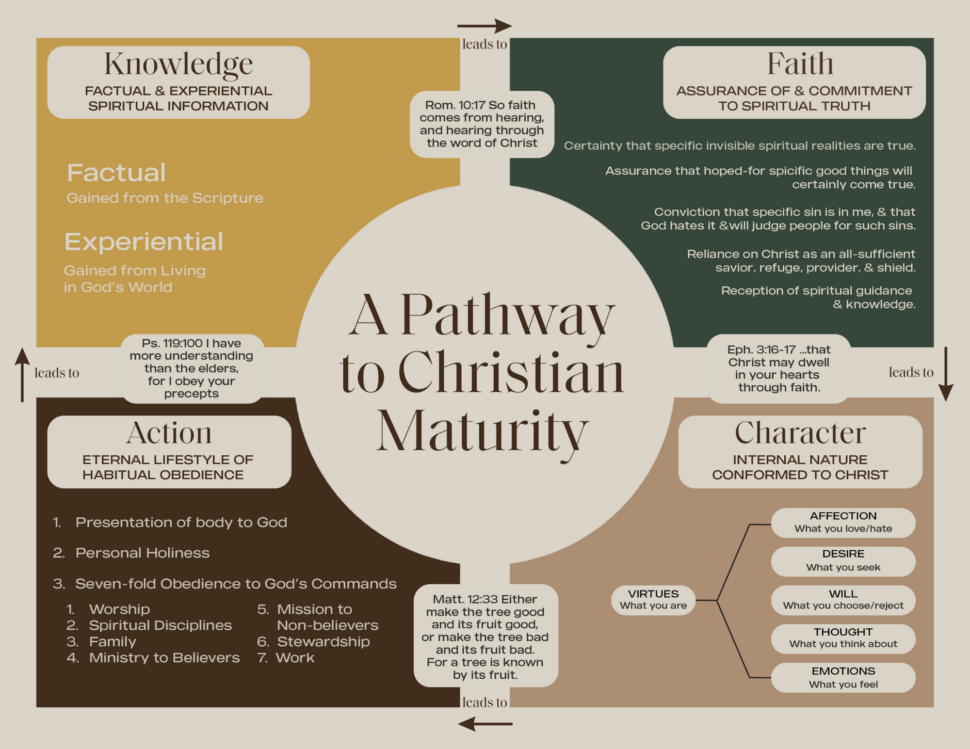
How Does Christ’s Work Ethic Redefine our Daily Labor?
John 5:17, John 9:4, Revelation 22:3
The theology of Christian work is perfected in the life of Jesus Christ. Jesus’ example of diligence in being about His Father’s work sanctifies all work for all Christians throughout all time:
- “‘My food,’ said Jesus, ‘is to do the will of him who sent me and to finish his work’” (John 4:34).
- “Jesus said to them, ‘My Father is always at his work to this very day, and I too am working’” (John 5:17b).
- “I have testimony weightier than that of John. For the works that the Father has given me to finish—the very works that I am doing—testify that the Father has sent me” (John 5:36).
- “As long as it is day, we must do the works of him who sent me. Night is coming, when no one can work” (John 9:4).
- “Are there not twelve hours of daylight? Anyone who walks in the daytime will not stumble, for they see by this world’s light” (John 11:9).
- “I have brought you glory on earth by finishing the work you gave me to do” (John 17:4).
In these statements, we see an incredible focus in Jesus. There was no time to waste, and at every moment he was focused on doing the work God had assigned him to do.
Modern Christians, besieged by innumerable distractions, must fight at every moment to keep focused on the work God has assigned us to do. In North Carolina, where I live, the biggest sporting event of the year is the NCAA men’s basketball tournament, called “March Madness.” In recent years, ESPN has offered constant streaming of daytime games directly to your computer at work, so you don’t have to miss a moment of any game you care about. What’s so amazing about this is that ESPN is shamelessly advertising this capability, showing workers at the office dressed up in face paint and cheering their teams rather than working diligently on their tasks.
Christ had perhaps three years in which to change history; three years in which to cure people; three years in which to teach multitudes about the Kingdom of God; three years in which to do the works of the One Who sent Him. At the end of that brief time, Jesus died. On the third day, God raised Him from the dead. He then had forty days to train His newborn church to prepare it for the works God would assign to them. Then, when the forty days were over, Jesus ascended to the sky, his time on earth finished. There was not a moment to lose.
We see a similar dedication in the Apostle Paul, who frequently spoke of his own labors for Christ:
- “You yourselves know that these hands of mine have supplied my own needs and the needs of my companions. In everything I did, I showed you that by this kind of hard work we must help the weak, remembering the words the Lord Jesus himself said: ‘It is more blessed to give than to receive’” (Acts 20:34–35).
- “To this very hour we go hungry and thirsty, we are in rags, we are brutally treated, we are homeless. We work hard with our own hands” (1 Corinthians 4:11–12a).
- “In beatings, imprisonments and riots; in hard work, sleepless nights and hunger” (2 Corinthians 6:5).
- “Are they servants of Christ? (I am out of my mind to talk like this.) I am more. I have worked much harder, been in prison more frequently, been flogged more severely, and been exposed to death again and again” (2 Corinthians 11:23).
- “To this end I also labor, striving according to His working which works in me mightily” (Colossians 1:29, NKJV).
- “For you yourselves know how you ought to follow our example. We were not idle when we were with you, nor did we eat anyone’s food without paying for it. On the contrary, we worked night and day, laboring and toiling so that we would not be a burden to any of you” (2 Thessalonians 3:7–8).
This is an overwhelming body of evidence of the incessant labors of the apostle Paul for the kingdom of Christ. And his labors were a mixture of practical work for money (tentmaking) and spiritual work in the gospel. From Acts 20:35 and 2 Thessalonians 3:7–8, we get the clear picture that Paul worked diligently with his own hands (almost certainly making tents) so that he could meet the financial needs of his traveling companions, who had left everything to follow Paul as he followed Christ.
Jesus and Paul set very clear examples before us: joyful labor in the Lord. And no task was beneath them. Jesus’ example of the foot washing (John 13:1–12) showed that he was willing to do the lowliest of tasks. No Christian can ever refuse to do some work because they think it too demeaning. Christ has removed that excuse forever.
from the foundation of the world, God himself worked. He created man to work. Jesus worked. Paul worked. So must we. And in this theology of work, we find immense dignity.
So, from the foundation of the world, God himself worked. He created man to work. Jesus worked. Paul worked. So must we. And in this theology of work, we find immense dignity. The straw of every moment—serving God and others—can be spun into gold. This occurs even when doing the homeliest of tasks: “So whether you eat or drink or whatever you do, do it all for the glory of God” (1 Corinthians 10:31). A Christian learns how to eat and drink to the glory of God, even though that meal will go into the stomach and then pass out of the body (Matthew 15:17). So also, a Christian learns how to wash dishes, mow the lawn, paint a fence, make a bed, do laundry, cook a meal, rake leaves, and take out the trash to the glory of God. Anything that does not come from faith is sin (Romans 14:23), but anything that does come from faith and is led by the Spirit is eternal. This is how we spin straw into gold.
And in heaven, we will work as well. Though we cannot be specific about this, the New Heaven and New Earth will not be a place of idleness, but of creative labor for the glory of the Lord: “No longer will there be any curse. The throne of God and of the Lamb will be in the city, and his servants will serve him” (Revelation 22:3). The removal of the curse is not an end to work, but rather a promise that the work we do in service to God will be richly blessed.
(Excerpt from An Infinite Journey, by Andy Davis, pages 408-411)




